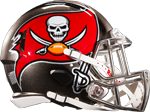1978 Tampa Bay Buccaneers Season 3 Brief
The 1978 Tampa Bay Buccaneers season was the team's third in the National Football League. As their two 1977 victories had been in the last two games of the season, they entered the 1978 season with the longest active winning streak in the NFC Central.
The Buccaneers entered the season with new offensive talent, having selected Doug Williams with the 17th overall pick of the draft. This choice was questioned by many, as there was still an element of society who claimed that a black quarterback was not mentally capable of winning in the NFL, and prejudice is believed to have been a factor in Williams having been drafted as low as seventeenth. According to Buccaneer coach John McKay, "All things being equal, Williams would have gone higher in the draft". Second-year tight end Jimmie Giles, part of the trade that landed Williams, emerged as the Buccaneers’ first receiving threat and to this day holds several of their scoring records.
Offseason
Offseason coaching changes led to continued accusations of disorganization, as vice-president of operations Ron Wolf resigned, citing only "personal matters". This renewed speculation that head coach John McKay, who replaced Wolf with two of his own longtime assistants, was trying to consolidate front-office power. The coaching staff was reshuffled, with Tom Bass being named defensive coordinator, and offensive coordinator Joe Gibbs hired away from the St. Louis Cardinals. Offensive line coach Jerry Frei left to take the same position with the Chicago Bears.
Tight end Bob Moore was traded, along with a 1979 first-round draft pick, for three-time All-Pro Bears defensive end Wally Chambers. The Buccaneers were widely considered to have given up too much in the trade, as Chambers was coming off of major knee surgery and was considered by many to be "damaged merchandise", and the Buccaneers were left with minimal experience at tight end. The trade was also criticized on the grounds that the Buccaneers did not require Chambers to undergo a team physical, despite his injury history. Council Rudolph, the only player who had started in all 28 of the Buccaneers’ games to date, was made expendable by the trade and was dealt to the Miami Dolphins for a draft pick.
Preseason speculation ran high about what would happen with the Buccaneers’ first overall choice in the draft, with Houston Oilers’ coach Bum Phillips reportedly stating that the Oilers would better any other team's offer to the Buccaneers. Unlike the previous year, when it was made clear early on that Ricky Bell was to be their choice, the Buccaneers kept quiet about who they might draft, further fueling speculation about a trade. The New York Jets were said to have offered their fourth-overall draft pick, plus any player on their roster other than Richard Todd. Tight end was considered to be the Buccaneers’ single greatest need, with Ken MacAfee of Notre Dame often mentioned as a likely draft target. According to Don Shula, "With John McKay's type of offense, an outstanding tight end is absolutely essential. It cannot go without one". This happened to be one of the positions hit hardest by injury in 1977. With most of their mid-round draft picks traded away, the Buccaneers were looking for a trade that would bring them several draft picks. With no teams willing to give up a starting quarterback as part of a deal, the Buccaneers eventually traded the pick to the Oilers, for tight end Jimmie Giles and the Oilers’ first- and second-round picks in 1978, and their third- and fifth-round picks in 1979. Needing a fullback, the Buccaneers shortly afterward traded Anthony Davis to the Oilers for Don Hardeman.
NFL Draft
Draft trades
The Buccaneers' first overall selection in the 1978 draft was traded to the Houston Oilers in exchange for four draft picks and tight end Jimmie Giles. The Oilers used the pick to select running back Earl Campbell. The Buccaneers’ 3rd-, 4th-, and 6th round picks were traded to the Oakland Raiders for guard Dan Medlin, tackle Jeff Winans, and linebacker Rik Bonness, respectively. Their 5th-round pick was traded to the Miami Dolphins for cornerback Jeris White. The Buccaneers received a 6th-round pick from the Los Angeles Rams for center Dan Ryczek. Their 7th-round pick was traded to the Atlanta Falcons in return for kicker Allan Leavitt. Their 11th-round pick, along with a second 10th-rounder obtained from the Raiders, were traded to the Pittsburgh Steelers in return for defensive tackle Ernie Holmes.
Draft Selections
The Buccaneers had a reduced number of selections in what was considered to have been the weakest draft in a long time. Doug Williams was considered to be the closest thing to a can't-miss quarterback prospect available in the draft. Representatives of several other teams, including Green Bay Packers coach and NFL Hall of Fame quarterback Bart Starr, called the Buccaneers to congratulate them on his selection. John McKay, in charge of the draft for the first time, stated that with no outstanding quarterbacks expected to be in the following year's draft, the team had to have Williams. Johnny Davis was a surprise selection, as running back was considered to be one of the team's deepest positions, but Davis was drafted for his blocking ability. McKay pointed out that many of the previous year's quarterback sacks had been the result not of offensive line breakdowns, but of failure of running backs to pick up blitzes. Brett Moritz played half of the 1977 season at Nebraska, after transferring from West Point. He was projected as a backup center. McKay traded a 10th- and an 11th-round pick, players who would not be expected to make the team anyway, to the Pittsburgh Steelers for Ernie Holmes, at one time an important part of the Steelers’ championship defenses. Holmes, who was once involved in a shotgun standoff with police after an incidence of acute paranoid psychosis, was traded for on the understanding that his personal problems were behind him. Steelers coach Chuck Noll called the trade "a gift". The Buccaneers once again passed on offensive linemen, saying that the existing players would improve with more time together, and that the best linemen were all drafted early. The Buccaneers later traded a future draft choice to the Detroit Lions for veteran tackle Rockne Freitas.
Preseason
Doug Williams’ first preseason pass, an 75-yard incompletion that sailed 10 yards past receiver Isaac Hagins, drew a standing ovation from the Tampa Stadium crowd. He was the first quarterback in Buccaneer history capable of throwing long passes downfield. Miami Dolphins nose tackle Randy Crowder, freshly released from federal prison, was signed as a free agent. Ernie Holmes, who was having trouble adjusting to the Buccaneers’ 3–4 defense, was waived to make room for him. A 1979 3rd-round draft pick was sent to the Dolphins as NFL-ordered compensation. Johnny Davis and Jimmy DuBose performed so well in the preseason that newly acquired fullback Don Hardeman was sent to the Baltimore Colts for a future draft pick. Wins in their first three preseason games, combined with the two wins at the end of the previous season, gave the Buccaneers the longest active NFL win streak going into the final preseason game. That game, a loss to the Dolphins, was the first Buccaneer game to sell out.
Regular Season
The Buccaneers opened the season, like their expansion brethren the Seattle Seahawks, 200-to-1 longshots to win the Super Bowl. Their regular-season opener against the New York Giants marked the first time that Las Vegas oddsmakers favored the Buccaneers to win, with Jimmy the Greek naming them as 1-point favorites. A pair of mistake-prone early losses left McKay threatening to release players who cause game-losing errors, a change from the earlier attitude of tolerating mistakes from players who were regarded as having potential. With the defense among the best in the league and the offense sparking behind Doug Williams’ leadership, the Buccaneers began to be respected as a competitive NFL team. Coach McKay's respect for Williams was such that he spoke of eventually letting Williams call his own plays in the huddle. McKay's insistence on calling plays from the sideline had been a source of much conflict between McKay and Steve Spurrier during the 1976 season. Williams led the Buccaneers to a 4–4 start before suffering an injury that required his jaw to be wired shut. Even before Williams’ injury, the Buccaneers again found themselves with an injured reserve list in double digits. At midseason, the Buccaneers had 11 players on injured reserve, not counting waived quarterback Mike Boryla. McKay felt that, with a healthy offense, the team would have finished with at least a 10–6 record. Despite a defense that ranked fourth overall in the NFL, the Buccaneers were only able to win one of their remaining eight games behind backup quarterback Mike Rae. McKay summed up the season with the word "frustration". The 9–7 record that he predicted the team would finish with would have been enough to win the NFC Central. Nose tackle Dave Pear became the first Buccaneer selected to the Pro Bowl, finishing third in voting among defensive tackles behind Randy White and Larry Brooks. Linebacker Richard Wood's 168 tackles stood for 14 years as a team record.
| PRESEASON | ||||
| Date | Opponent | Week/Record | Outcome | |
| Saturday Aug. 5 |
Cincinnati Bengals Tampa Stadium, Tampa Bay, FL |
PS - wk 1
1-0 |
Won 17-0 | |
| Saturday Aug. 12 |
Baltimore Colts Tampa Stadium, Tampa Bay, FL |
PS - wk 2
2-0 |
Won 23-12 | |
| Saturday Aug. 19 |
@ New Orleans Saints Louisiana Superdome, New Orleans, LA |
PS - wk 3
3-0 |
Won 14-3 |
|
| Friday Aug. 25 |
Miami Dolphins Tampa Stadium, Tampa Bay, FL |
PS - wk 4
3-1 |
Lost 20-24 | |
1978 Season ResultsRecord: 5-11, DIV: 2-6 (5th in NFC Central) |
||||
| Date | Opponent | Week/Record | Outcome | |
| Saturday Sep. 2 |
New York Giants Tampa Stadium, Tampa Bay, FL |
RS - wk 1
0-1 |
Lost 13-19 | |
| Saturday Sep. 9 |
Detroit Lions
Tampa Stadium, Tampa Bay, FL |
RS - wk 2
0-2 |
Lost 7-15 | |
| Sunday Sep. 17 |
@ Minnesota Vikings Metropolitan Stadium, Bloomington, MN |
RS - wk 3
1-2 |
Won 16-10 | |
| Sunday Sep. 24 |
Atlanta Falcons Tampa Stadium, Tampa Bay, FL |
RS - wk 4
2-2 |
Won 14-9 | |
| Sunday Oct. 1 |
Minnesota Vikings
Tampa Stadium, Tampa Bay, FL |
RS - wk 5
2-3 |
Lost 7-24 | |
| Sunday Oct. 8 |
@ Kansas City Chiefs
Arrowhead Stadium, Kansas City, MO |
RS - wk 6
3-3 |
Won 13-30 | |
| Sunday Oct. 15 |
@ New York Giants
Giants Stadium, East Rutherford, NJ |
RS - wk 7
3-4 |
Lost 14-17 | |
| Sunday Oct. 22 |
Chicago Bears Tampa Stadium, Tampa Bay, FL |
RS - wk 8
4-4 |
Won 33-19 | |
| Sunday Oct. 29 |
@ Green Bay Packers
Lambeau Field, Green Bay, WI |
RS - wk 9
4-5 |
Lost 7-9 | |
| Sunday Nov. 5 |
@ Los Angeles Rams
Los Angeles Memorial Coliseum, Los Angeles, CA |
RS - wk 10
4-6 |
Lost 23-26 | |
| Sunday Nov. 12 |
@ Detroit Lions
Pontiac Silverdome, Pontiac, MI |
RS - wk 11
4-7 |
Lost 23-34 | |
| Sunday Nov. 19 |
Buffalo Bills Tampa Stadium, Tampa Bay, FL |
RS - wk 12
5-7 |
Won 31-10 |
|
| Sunday Nov. 26 |
@ Chicago Bears
Soldier Field, Chicago, IL |
RS - wk 13
5-8 |
Lost 3-14 | |
| Sunday Dec. 3 |
Green Bay Packers
Tampa Stadium, Tampa Bay, FL |
RS - wk 14
5-9 |
Lost 7-17 |
|
| Sunday Dec. 10 |
@ San Francisco 49ers Candlestick Park, San Francisco, CA |
RS - wk 15
5-10 |
Lost 3-6 |
|
| Saturday Dec. 17 |
New Orleans Saints Tampa Stadium, Tampa Bay, FL |
RS - wk 16
5-11 |
Lost 10-17 |
|
| PLAYOFFS | ||||
| Date | Opponent | NFC/Superbowl | Outcome | |
| Season Ended |
@ Tampa Bay Buccaneers Tampa Stadium, Tampa Bay, FL |
None
None |
00-00 | |




